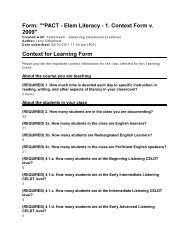The Tutoring Book - California State University, Sacramento
The Tutoring Book - California State University, Sacramento
The Tutoring Book - California State University, Sacramento
Create successful ePaper yourself
Turn your PDF publications into a flip-book with our unique Google optimized e-Paper software.
<strong>The</strong> Value of Writing Center Tutors as Writing Tutors<br />
127<br />
Laura West and Beth Pearsall<br />
Spring 2009<br />
Current pedagogy attempts to define effective practices in writing centers in response to the<br />
perceived potential of this ‘other’ space. Operating outside institutionally imposed expectations, but<br />
charged with supporting the less powerful individuals within that institution, tutors and writing center<br />
administrators are confronted with a tremendous challenge: support the ‘man’ or fight the ‘man?’ Tutors<br />
find themselves at the center of a tug-of-war as theorists vie to define their methods and rescue writing<br />
instruction from its quandary of whether to focus on teaching standards or honoring diversity. Much of<br />
this discussion stems from differing views on what the purpose of a writing center and, more specifically,<br />
a tutor are. In particular, theorists (and practitioners in our class) do not agree on the basic tenets of how a<br />
writing center should be structured: most basically, in what subject areas tutors should be trained.<br />
Although this seems like a fairly basic question (i.e. we are writing tutors, so shouldn’t we be trained in<br />
writing?), it actually poses a subject for much discussion in the world of theory. Most notably, this<br />
discussion plays out in the debate between having discipline-specific tutors that focus on particular areas<br />
of study and generalized tutors who are trained in the discipline of writing.<br />
<strong>The</strong> first step we wish to take in order to enter into this conversation is to establish a vocabulary<br />
with which to discuss this issue, and, in so doing give a sense of the purpose of this paper. <strong>The</strong>re is no<br />
reasonable distinction between what has been described as a “discipline-specific” tutor and a<br />
“generalized” tutor. A “discipline-specific” tutor is trained in a specific discipline. So too is the<br />
“generalized” tutor. <strong>The</strong> “generalized” tutor is trained in the discipline of writing and will for our<br />
purposes be called a writing-specific tutor, a term that we feel more effectively captures the expertise of<br />
tutors working in most writing centers today. Furthermore, this nomenclature is more appropriate for<br />
those who staff writing centers, the purpose of which is to tutor students on writing-specific tasks.<br />
In <strong>Tutoring</strong> Writing: A Practical Guide for Conferences, Donald McAndrew and Thomas<br />
Reigstad propose that tutoring is best performed by tutors with specialized training in the disciplines of<br />
their tutees. This proposal is based on a 1993 study performed by Jean Kiedaish and Sue Dinitz in which<br />
they observe that “students writing papers for upper-level courses would be best served by carefully<br />
trained tutors with knowledge of the discipline,” a position McAndrew and Reigstad support (McAndrew<br />
72). <strong>The</strong> authors argue that although generalized tutors can help writers in all disciplines well enough,<br />
“well-trained tutors who are knowledgeable about a discipline can be of even more help because they can<br />
read like the audience for the piece, in this case experts in the discipline” (73). Further, although<br />
McAndrew and Reigstad recognize the benefits of specialized and writing-specific tutors, they pose that<br />
“the best would be to acknowledge areas of expertise among all tutors and cluster that expertise into<br />
specialty teams based on academic areas” (73). <strong>The</strong>y conclude that a writing center would function best<br />
if it were broken up into schools of study, like “colleges in a university” (73). This, they assert, would<br />
allow tutors to have a greater knowledge base of the subject matter students are writing about as well as<br />
the conventions of discourse expected in the discipline.<br />
Although the benefit of discipline-specific tutors might be seen as their ability to converse more<br />
confidently with the tutee about the area of study, we might conclude from this, however, that the<br />
discipline-specific tutor is in greater danger than a writing-specific tutor of focusing on content rather<br />
than the writing process of the tutee. This concern is echoed again and again by theorists attempting to<br />
address perceived problems of writing centers. If North’s contention is correct and tutors improve writers<br />
and not texts, then discipline-specific tutoring can have a negative impact on tutoring sessions.<br />
Potentially, these tutors could harm a tutee’s development as a writer by focusing on helping her or him<br />
create a text that is adequate in regards to content, instead of helping the tutee become a more successful<br />
writer over all. In the seemingly never-ending battle to discourage academia from seeing the writing<br />
center as a “fix-it” shop, there is a de-emphasis on grammar and other mechanical concerns. To tell tutees<br />
that we won’t fix your grammar but we’ll be happy to fix your content will certainly impair efforts to

















